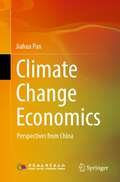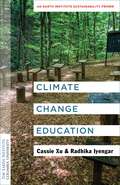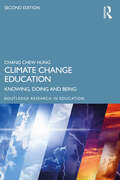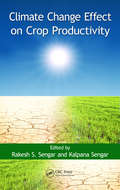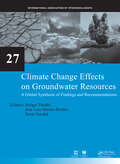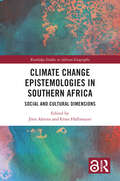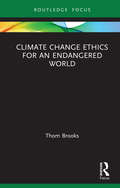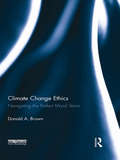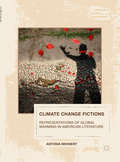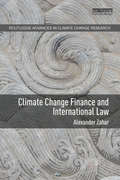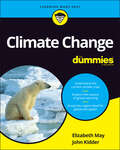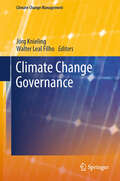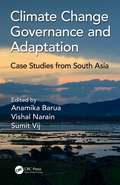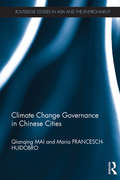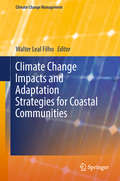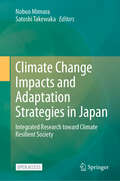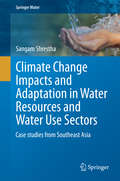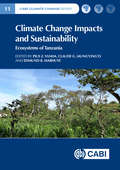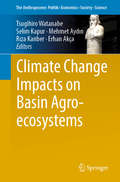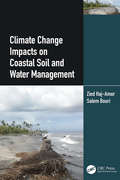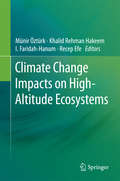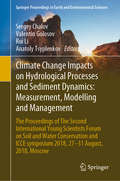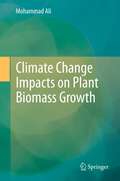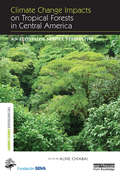- Table View
- List View
Climate Change Economics: Perspectives from China
by Jiahua PanThis book establishes theories and methods of climate change economics based on the perspective of human development. The book, in two volumes, consists of papers and research reports authored by Pan Jiahua or researchers under his guidance. Professor Pan Jiahua is a leading figure in the field of political economy in climate change and has written extensively. The book is divided into four parts, covering theories, methods, governance, and policies. • The theory part includes the general economics of climate change, the political economy of climate change, carbon emissions, and human development. • The method part covers the economic analysis of greenhouse gas reduction and economics of low-carbon economic development. • The governance is on the design and construction of international climate regimes and China's role and choice. • Finally, the policy part consists of three chapters: policy choices for low-carbon transformation, energy-saving emission reduction, and low-carbon development and adaptation to climate change. The disciplines involved in climate change economics include welfare economics, development economics, international political economics, and property rights economics. In the context of multidisciplinary cross-cutting, the economics of climate change has evolved. The book proposes theories, methods and offers policy solutions and cases. It is of high academic and empirical value for developing countries to strive for fair rights and interests in international climate negotiations, obtain development space, and pursue a low-carbon and ecological economy. Professor Jiahua Pan and his team at the Chinese Academy of Social Sciences have contributed greatly to the development of climate change economics in China. Their work has laid the foundation of climate change economics from basic concepts, frameworks, and systems and has a great significance in promoting the development of climate change economics.
Climate Change Education: An Earth Institute Sustainability Primer (Columbia University Earth Institute Sustainability Primers)
by Radhika Iyengar Luo Cassie XuClimate change affects every person and society, every community and industry. Education at all levels, in all disciplines, and both inside and outside official institutions must now address climate change and its many effects on social and environmental systems. This book provides a framework for putting climate change at the forefront of educational agendas and pedagogical tools for teaching climate science across local and global settings.Cassie Xu and Radhika Iyengar present evidence-based teaching practices and strategies that are grounded in a broad conception of education and emphasize a systems approach. They share examples of effective approaches in diverse learning environments—not just in classrooms and other formal settings but also informal contexts with communities and families. This book makes the case that students and other learners need to understand climate science and the physical and social impacts of climate change not only to be good citizens but also to be well prepared for different career paths. Xu and Iyengar highlight systemic barriers and inequalities, reflecting on how to bring marginalized voices and perspectives into educational spaces. Providing a foundation for interdisciplinary environmental education, this book underscores that how we teach future generations about climate change will shape our future.
Climate Change Education: Knowing, Doing and Being (Routledge Research in Education)
by Chang Chew HungClimate change is complex and there is a need to educate our future generations so that they are able to deal with the plethora of information and views that they come into contact with in their lives. This book inquires into what it means to teach and learn about climate change. Now in its second edition, Chang further explores what education for climate change entails, discussing the concept of climate change education (CCE) itself, how it is taught in schools and how public education is being carried out. Featuring updated literature in a quickly advancing field, the book defines CCE for the global citizen and looks at pedagogies supporting CCE. It also identifies teachers as key stakeholders in climate change discourse, how to improve teacher readiness on the topic and how teacher professional development can support successful implementation of CCE. This book will be invaluable to climate change educators and can act as a reference resource for teachers, education policymakers and public education agencies.
Climate Change Effect on Crop Productivity
by Rakesh S. Sengar Kalpana SengarExplore the Relationship between Crop and ClimateAgricultural sustainability has been gaining prominence in recent years and is now becoming the focal point of modern agriculture. Recognizing that crop production is very sensitive to climate change, Climate Change Effect on Crop Productivity explores this timely topic in-depth. Incorporating contri
Climate Change Effects on Groundwater Resources: A Global Synthesis of Findings and Recommendations (IAH - International Contributions to Hydrogeology)
by Holger Treidel & Jose Luis Martin-Bordes Jason J. GurdakClimate change is expected to modify the hydrological cycle and affect freshwater resources. Groundwater is a critical source of fresh drinking water for almost half of the worlds population and it also supplies irrigated agriculture. Groundwater is also important in sustaining streams, lakes, wetlands, and associated ecosystems. But despite this,
Climate Change Epistemologies in Southern Africa: Social and Cultural Dimensions (Routledge Studies in African Geography)
by Jörn Ahrens and Ernst HalbmayerThis book investigates the social and cultural dimensions of climate change in Southern Africa, focusing on how knowledge about climate change is conceived and conveyed. Despite contributing very little to the global production of emissions, the African continent looks set to be the hardest hit by climate change. Adopting a decolonial perspective, this book argues that knowledge and discourse about climate change has largely disregarded African epistemologies, leading to inequalities in knowledge systems. Only by considering regionally specific forms of conceptualizing, perceiving, and responding to climate change can these global problems be tackled. First exploring African epistemologies of climate change, the book then goes on to the social impacts of climate change, matters of climate justice, and finally institutional change and adaptation. Providing important insights into the social and cultural perception and communication of climate change in Africa, this book will be of interest to researchers from across the fields of African studies, sociology, anthropology, philosophy, political science, climate change, and geography.
Climate Change Ethics for an Endangered World (Routledge Focus on Environment and Sustainability)
by Thom BrooksClimate change confronts us with our most pressing challenges today. The global consensus is clear that human activity is mostly to blame for its harmful effects, but there is disagreement about what should be done. While no shortage of proposals from ecological footprints and the polluter pays principle to adaptation technology and economic reforms, each offers a solution – but is climate change a problem we can solve? In this provocative new book, these popular proposals for ending or overcoming the threat of climate change are shown to offer no easy escape and each rest on an important mistake. Thom Brooks argues that a future environmental catastrophe is an event we can only delay or endure, but not avoid. This raises new ethical questions about how we should think about climate change. How should we reconceive sustainability without a status quo? Why is action more urgent and necessary than previously thought? What can we do to motivate and inspire hope? Many have misunderstood the kind of problem that climate change presents – as well as the daunting challenges we must face and overcome. Climate Change Ethics for an Endangered World is a critical guide on how we can better understand the fragile world around us before it is too late. This innovative book will be of great interest to students and scholars of climate change, climate justice, environmental policy and environmental ethics.
Climate Change Ethics: Navigating the Perfect Moral Storm
by Donald A. BrownClimate change is now the biggest challenge faced by humanity worldwide and ethics is the crucial missing component in the debate about what to do about this enormous threat. This book examines why thirty-five years of discussion of human-induced warming has failed to acknowledge fundamental ethical concerns, and subjects climate change’s most important policy questions to ethical analysis. This book examines why ethical principles have failed to gain traction in policy formation and recommends specific strategies to ensure that climate change policies are consistent with ethical principles. Because climate change is a global problem that requires a global solution and given that many nations refuse participation due to perceived inequities in proposed international solutions, this book explains why ensuring that nations, sub-national governments, organizations, businesses and individuals acknowledge and respond to their ethical obligations is both an ethical and practical mandate. This book is the first of its kind to go beyond a mere account of relevant ethical questions to offer a pragmatic guide on how to make ethical principles influential in formulating the world’s response to climate change. Written by Donald A. Brown, a leading voice in the field, it should be of interest to policy makers, and those studying environmental policy, climate change policy, international relations, environmental ethics and philosophy.
Climate Change Fictions: Representations of Global Warming in American Literature (Literatures, Cultures, and the Environment)
by Antonia MehnertThis book highlights the importance of the cultural sphere, and in particular literature, in response and discussion with the unprecedented phenomenon known as climate change. Antonia Mehnert turns to a set of contemporary American works of fiction, reading them as a unique response to the challenges of representing climate change. She draws on "climate change fiction"-- texts dealing explicitly with anthropogenic climate change--and explores how these works convey climate change, deal with its challenging characteristics, and with what narrative techniques they ultimately participate in its communication. Indeed, a number of challenging traits make climate change a difficult issue to engage with including its slow and long temporal dimension, global scale, scientific controversy, and its disconnect between cause and effect. Considering such complexity and uncertainty at the source of climate change fictions, this book moves beyond a solely ecocritical analysis and shows how these climate change fictions constitute an insightful cultural repertoire valuable for discussion in the environmental humanities in general.
Climate Change Finance and International Law (Routledge Advances in Climate Change Research)
by Alexander ZaharSince 2010, a significant quantity of international climate change finance has begun to reach developing countries. However, the transfer of finance under the international climate change regime – the legal and ethical obligations that underpin it, the constraints on its use, its intended outcomes, and its successes, failures, and future potential – constitutes a poorly understood topic. Climate Change Finance and International Law fills this gap in the legal scholarship. The book analyses the legal obligations of developed countries to financially support qualifying developing countries to pursue globally significant mitigation and adaptation outcomes, as well as the obligations of the latter under the international regime of financial support. Through case studies of climate finance mechanisms and a multitude of other sources, this book delivers a rich legal and empirical understanding of the implementation of states’ climate finance obligations to date. The book will be of interest to scholars and students of international law and policy, international relations, and the maturing field of climate change law.
Climate Change For Dummies
by Elizabeth May John KidderMaster the hottest—and most chilling—topic in the world today More and more frequent extreme weather events occur each year, and wildlife everywhere is increasingly endangered. Science fiction or science fact, most climate experts see this as our world on climate change—and, according to polls, a majority of people around the globe agree. Climate Change For Dummies allows you to investigate this hottest of hotly debated issues for yourself—examining its causes, the way it affects our lives, and what we can all do to make a difference. This straightforward guide—cowritten by the former leader of Canada's Green Party and the Canadian Chief of Staff to the Minister of Natural Resources—sifts the fact from the fiction: Is climate change caused by human activity or by natural elements beyond our control? What contribution can clean energy make? What are our best and worst-case scenarios? What are the likely long- and short-term effects? How can human activity can impact the environment? Can individuals and governments help reverse the possible effects? Which are the best sources of cleaner energy? With the IPCC predicting a 2.5–10°F warming over the next century, this complex subject will be making temperatures soar for years to come—on both sides of the debate. Climate Change For Dummies is the ideal tool to navigate these increasingly choppy waters—and to make an informed difference where you can.
Climate Change Geoengineering
by Wil C. G. Burns Andrew L. StraussThe international community is not taking the action necessary to avert dangerous increases in greenhouse gases. Facing a potentially bleak future, the question that confronts humanity is whether the best of bad alternatives may be to counter global warming through human-engineered climate interventions. In this book, eleven prominent authorities on climate change consider the legal, policy, and philosophical issues presented by geoengineering. The book asks: When, if ever, are decisions to embark on potentially risky climate modification projects justified? If such decisions can be justified, in a world without a central governing authority, who should authorize such projects and by what moral and legal right? If states or private actors undertake geoengineering ventures absent the blessing of the international community, what recourse do the rest of us have?
Climate Change Governance (Climate Change Management)
by Walter Leal Filho Jörg KnielingClimate change is a cause for concern both globally and locally. In order for it to be tackled holistically, its governance is an important topic needing scientific and practical consideration. Climate change governance is an emerging area, and one which is closely related to state and public administrative systems and the behaviour of private actors, including the business sector, as well as the civil society and non-governmental organisations. Questions of climate change governance deal both with mitigation and adaptation whilst at the same time trying to devise effective ways of managing the consequences of these measures across the different sectors. Many books have been produced on general matters related to climate change, such as climate modelling, temperature variations, sea level rise, but, to date, very few publications have addressed the political, economic and social elements of climate change and their links with governance. This book will address this gap. Furthermore, a particular feature of this book is that it not only presents different perspectives on climate change governance, but it also introduces theoretical approaches and brings these together with practical examples which show how main principles may be implemented in practice.
Climate Change Governance and Adaptation: Case Studies from South Asia
by Anamika Barua, Vishal Narain and Sumit VijClimate change adaptation in South Asia is redefining the roles of different actors in the governance processes. The existing governance lack capacity, knowledge, and leadership skills to manage the uncertainties and challenges posed by climate change. This book aims to explain how the governance of climate change adaptation and mitigation is being shaped in the region and how climate change is impacting upon the governance of natural resources. Although the focus is on South Asia, the editors draw a wide range of contributions from northern and southern communities and across various agro-ecological contexts. Climate Change Governance and Adaptation: Case Studies from South Asia sees the changing climate not only as an environmental problem but as a societal challenge and discusses the governance challenges from an interdisciplinary social science perspective across different levels: local, state, and national. Discusses also the challenges and opportunities for increasing the resilience of the society through effective governance around climate change. A top down approach to govern climate change adaptation may not yield desired outcomes; instead the book emphasizes the need to integrate issues of equity, into climate governance and polices. The lessons learned from different cases across South Asia help readers have a better and deeper understanding of the relationships between governance and climate change. Given the diversity of themes covered, this book will appeal not only to researchers and practitioners in the climate change community, but also to those with a broader interest in governance processes.
Climate Change Governance in Chinese Cities (Routledge Studies in Asia and the Environment)
by Qianqing Mai Maria Francesch-HuidobroIn the last thirty years, China has experienced rapid economic development and urbanisation which has resulted in high levels of environmental degradation and has put considerable pressure on the country’s infrastructure and natural resources. As China commits to considerably lower the carbon intensity of its economy, this volume analyses and explains the governance of climate change mitigation responses in major Chinese cities. The book focuses specifically on two highly carbon intensive sectors, buildings and transport, in Guangzhou, Shenzhen, and Hong Kong to explore how collaborative municipal networks function in practice in Chinese cities. The authors find that effective coordination relies on the political will of local administrative elites, the political significance attached to climate change issues, the legitimate authority granted to the coordinating agency, and human and financial capitals. Collaboration is hampered by limited span of network engagement, inadequate authority of the primary network participants, insufficient input and output legitimacy of the sectoral innovations, and missing linkages across functionally segregated sectors. The book concludes that the enhanced collaboration and coordination between networks that has emerged in the process of low carbon transitions is transforming the Chinese environmental state into a more pluralistic, inclusive and legitimate one. This book will be of interest to researchers and practitioners across disciplines including Chinese studies, environmental politics and policy, urban studies, and planning and geography.
Climate Change Impacts and Adaptation Strategies for Coastal Communities (Climate Change Management)
by Walter Leal FilhoThis book presents a comprehensive overview of research and projects regarding climate change adaptation in coastal areas, providing government and nongovernment bodies with a sound basis to promote climate change adaptation efforts. According to the 5th Assessment Report by the Intergovernmental Panel on Climate Change (IPCC), coastal zones are highly vulnerable to climate change, and climate-driven impacts may be further exacerbated by other human-induced pressures. Apart from sea-level rise, which poses a threat to both human well-being and property, extreme events such as cyclones and storm surges lead not only to significant damage to property and infrastructure, but also to salt water intrusion, groundwater salinisation, and intensified soil erosion, among many other problems. There are also numerous negative impacts on the natural environment and biodiversity, including damage to important wetlands and habitats that safeguard the overall ecological balance, and consequently the provision of ecosystem services and goods on which the livelihoods of millions of people depend. As such, there is a need for a better understanding of how climate change affects coastal areas and communities, and for the identification of processes, methods and tools that can help the countries and communities in coastal areas to adapt and become more resilient. It is against this background that this book has been produced. It includes papers written by scholars, social movements, practitioners and members of governmental agencies, pursuing research and/or executing climate change projects in coastal areas and working with coastal communities. Focusing on "managing climate change in coastal regions", it showcases valuable lessons learned from research and field projects and presents best practices to foster climate change adaptation in coastal areas and communities, which can be implemented elsewhere.
Climate Change Impacts and Adaptation Strategies in Japan: Integrated Research toward Climate Resilient Society
by Nobuo Mimura Satoshi TakewakaThis open access book presents the latest Japanese research for the projection of climate change impacts and the evaluation of adaptation policies, with a particular focus on the S-18 Project—a nationwide, interdisciplinary research initiative involving experts from various fields. Readers can get a comprehensive view of the latest knowledge and strategies to combat climate change impacts in Japan. The topics span the research framework and future scenarios for climatic and socio-economic changes, and impacts and adaptation measures in major sectors at both national and local levels. Target sectors include agriculture, forestry and fisheries, natural ecosystems, natural disasters and coastal zones, water resources, urban infrastructure, and transportation, quality of life and human health, and economic analysis of the impacts. The book features high-resolution spatial distribution of impacts, changes in vulnerability with localities, effects of mitigation and adaptation measures, and implications of climate change policies on society. As the world experiences increased extreme weather events, this comprehensive book is a timely reference for similar studies in other countries through the presentation of research results and lessons obtained in Japan. Researchers, policymakers, and academics in environmental science, climate policy, and related fields will find this book invaluable for understanding and addressing the multifaceted challenges of climate change adaptation and mitigation. Some chapters were written originally in Japanese. The English translation was facilitated by artificial intelligence. The authors later revised the content for accuracy.
Climate Change Impacts and Adaptation in Water Resources and Water Use Sectors: Case studies from Southeast Asia (Springer Water)
by Sangam ShresthaClimate change on earth is having significant impacts on water resources management in Southeast Asia. Knowledge of climate variations and climate change can be valuable for water resources management in agriculture, urban and industrial water supplies, hydroelectric power generation, and ecosystem maintenance. This book presents the findings of case studies on forecasting climate change and its impacts on water availability, irrigation water requirements, floods and droughts, reservoir inflows and hydropower generation, and crop yield in specific basins of Southeast Asian countries such as Thailand, Myanmar, and Vietnam. All case studies start by forecasting the climate change and investigating its impacts by employing several hydrological reservoir simulations and crop water requirement models. The findings provide sound and scientific advice for water managers on the real impacts of climate change and how to adapt to its many challenges.
Climate Change Impacts and Sustainability: Ecosystems of Tanzania (CABI Climate Change Series)
by Eugen Cyrilo Namkunda Johnson Richard J Katondo Godwin A Lema Emma T Liwenga N A Mbwambo Anselm R Mwajombe Patrick M Ndaki Agnes Ms Nyomora Noah M Pauline Florian Silangwa Kelvine C Shirima Pontian L Temba Adera Sisay Wassie Lucas E Yamat Josephine M ZimbaThis book provides a detailed analysis of the economic and environmental impacts of climate change on the tropical ecosystems in Tanzania. Topics covered include agriculture, marine resources, wildlife, and weather forecasting. The analyses concentrate on real and potential impacts of climate change, focusing on changes in temperature and precipitation. Adaptive capacity and strategies for enhancing resilience (such as changing crop types and crop patterns in farming) are described. Particular attention is paid to climate change impacts on vulnerability and resilience in communities and ecosystems with special reference to extreme events such as droughts and flooding. The book: is among the first books to analyse in detail climate change effects in Tanzania, highlighting the unique vulnerability of communities and ecosystems in East Africa from a socio-ecological point of view. discusses potential future threats as well as providing solutions to current problems. examines the application of local knowledge systems when formulating solutions. The book is essential reading for researchers on climate change and socio-economic impacts in tropical rural economies and of broad interest to climate change scientists, tropical ecologists, conservationists and agricultural scientists.
Climate Change Impacts on Basin Agro-ecosystems (The Anthropocene: Politik—Economics—Society—Science #18)
by Selim Kapur Erhan Akça Tsugihiro Watanabe Mehmet Aydın Rıza KanberThis book is based on the outcomes of a Turkish-Japanese bilateral project dealing with the impacts of climate change on basin agro-ecosystems. The book is unique in showing an up-to-date knowledge for the developing world. The chapters are related to: a) the development and improvement of a regional climate model for a more accurate prediction with higher resolution of future changes in regional climate, b) the structure of land and water management in agricultural production systems in arid areas, especially to quantitatively evaluate the relationships among cropping systems, hydrological cycle and water balance in farmland and its environments, c) the assessment of the impact of climate change and its adaptation on agricultural production systems, mainly on the aspect of land and water management, and d) the vulnerability of agricultural production systems from natural changes and the measures for enhancing sustainability of agriculture.This book elaborates on the methodologies for the assessment of climate change impacts on agricultural production and adaptationIn this book, the concepts and processes of an integrated approach are outlined, and its application in a case project is introducedThe approaches described in the chapters would be applicable in different situations and could be improved with experience and the introduction of advanced techniques
Climate Change Impacts on Coastal Soil and Water Management
by Zied Haj-Amor Salem BouriClimate Change Impacts on Coastal Soil and Water Management discusses the latest approaches for monitoring soil and water degradation in coastal regions under current climate conditions as well as potential further changes in the future. It presents an overview of climate change impacts on soil and water resources and summarizes the adaptation of practical options and strategies to minimize the potential risks, such as land degradation, seawater intrusion, droughts, ocean acidification, etc. The book aims to promote the adoption of best practices, which can be selected and implemented according to the respective local conditions. In addition, the recommendations for specific soil and water use planning strategies to address climate change can also be incorporated into national and international development plans. Features: • Presents the general properties and analysis of soil and water resource conditions for coastal regions • Offers practical advice for adapting to climate change through case studies from diverse coastal settings around the globe • Presents information in an accessible format for practitioners in soil and water sciences, as well as for those working in related disciplines • Includes end-of-chapter summaries and homework problems Written primarily for practicing soil, water, agricultural, and environmental scientists, this book provides the latest research on soil and water resources management, soil processes and properties, and the related effects of climate change. It assesses the effectiveness of the methods currently in use and under future climate change scenarios as well.
Climate Change Impacts on High-Altitude Ecosystems
by Khalid Rehman Hakeem Münir Öztürk I. Faridah-Hanum Recep EfeThis book covers studies on the systematics of plant taxa and will include general vegetational aspects and ecological characteristics of plant life at altitudes above 1000 m. from different parts of the world. This volume also addresses how upcoming climate change scenarios will impact high altitude plant life. It presents case studies from the most important mountainous areas like the Himalayas, Caucasus and South America covering the countries like Malaysia, Sri Lanka, India, Nepal, Pakistan, Kirghizia, Georgia, Russia,Turkey, Indonesia, Malaysia and the Americas. The book will serve as an invaluable resource source undergraduates, graduate students, and researchers.
Climate Change Impacts on Hydrological Processes and Sediment Dynamics: The Proceedings of The Second International Young Scientists Forum on Soil and Water Conservation and ICCE symposium 2018, 27–31 August, 2018, Moscow (Springer Proceedings in Earth and Environmental Sciences)
by Rui Li Sergey Chalov Valentin Golosov Anatoly TsyplenkovThis book offers a collection of conference articles presented at the Second International Young Scientists Forum on Soil and Water Conservation and ICCE symposium 2018 “Climate Change Impacts on Sediment Dynamics: Measurement, Modelling, and Management” held at Moscow from 27 to 31 August 2018. This conference was organized by World Association of Soil and Water Conservation (WASWAC) and Lomonosov Moscow State University in cooperation with the International Commission on Continental Erosion of the International Association of Hydrological Sciences and World Large rivers Initiative. Topics in this book cover a wide range of questions related to fluvial geomorphology, water studies, and sediment transport.
Climate Change Impacts on Plant Biomass Growth
by Mohammad AliThis book offers a methodical explanation of our biomass-driven ecosystem, the undeniable uncertainties posed by the response of vegetation to changes in environmental conditions and the fact that humans everywhere have an interest, even an obligation, to cooperate in a global campaign to combat climate change.
Climate Change Impacts on Tropical Forests in Central America: An ecosystem service perspective (The Earthscan Forest Library)
by Aline ChiabaiThe loss of biodiversity is a major environmental problem in nearly every terrestrial ecosystem on Earth. This loss is accelerating driven by climate change, as well as by other causes including agricultural exploitation, fragmentation and degradation triggered by land use changes. The crucial issue under debate is the impact on the welfare of current and future population, and the role of humans in the exploitation of natural resources. This is of particular importance in Central America, which it is amongst the richest and most threatened biodiversity regions on the Earth, and where the loss of ecosystems strongly affects its socio-economic vulnerability. This book addresses the impacts of climate and land-use change on tropical forest ecosystems in this important region, and assesses the expected economic costs if no policy action is taken, under different future scenarios and for different geographical scales. This innovative collection utilises both theoretical approaches and empirical results to provide a conceptual framework for an integrated analysis of climate and land-use change impacts on forest ecosystems and related economic effects, offering insight into the complex relationship between ecosystems and benefits to humans. This important contribution to forest ecosystems and climate change provides invaluable reading for students and scholars in the fields of environmental and ecological economics, environmental science and forestry, natural resource management, agriculture and climate change.
